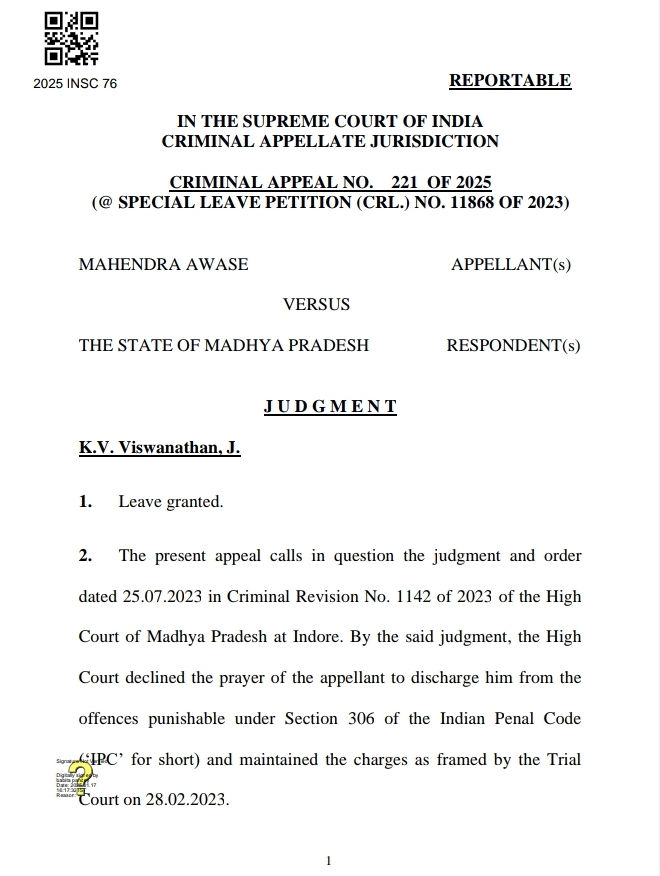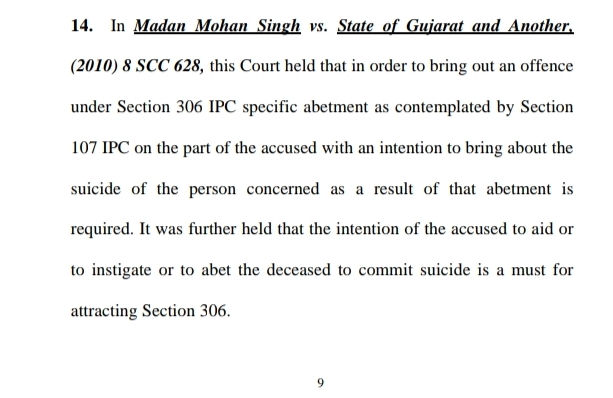On January 17, 2025, the Supreme Court of India delivered a landmark judgment in Mahendra Awase vs. State of Madhya Pradesh (2025 INSC 76), reinforcing the judicial principles governing Section 306 of the Indian Penal Code (IPC). The judgment serves as a crucial reminder of the stringent thresholds required to sustain charges of abetment to suicide under Indian law.

The appeal stemmed from charges framed against Mahendra Awase for allegedly abetting the suicide of Ranjeet Chauhan. Ranjeet’s body was found hanging from a tree on October 10, 2022. A suicide note recovered from the scene accused the appellant of harassment over the repayment of a loan that Ranjeet had guaranteed for a third party. In addition, forensic evidence included audio recordings of conversations between the appellant and the deceased, which allegedly reflected coercive behavior.
The First Additional Sessions Judge, Khargone, framed charges against the appellant under Section 306 IPC. The appellant’s revision petition challenging the charges was dismissed by the Madhya Pradesh High Court, prompting him to approach the Supreme Court. Question arose Whether the conduct of the appellant amounted to abetment under Section 306 IPC and What constitutes "abetment" under Sections 306 and 107 IPC?
S. 306 IPC Abetment of suicide. If any person commits suicide, whoever abets the commission of such suicide, shall be punished with imprisonment of either description for a term which may extend to ten years, and shall also be liable to fine..
S.107. Abetment of a thing.-A person abets the doing of a thing, whoFirst. - Instigates any person to do that thing; or Secondly. - Engages with one or more other person or persons in any conspiracy for the doing of that thing, if an act or illegal omission takes place in pursuance of that conspiracy, and in order to the doing of that thing; or Thirdly. - Intentionally aids, by any act or illegal omission, the doing of that thing

The court reiterated that mere harassment or heated exchanges, absent clear intent or causation, do not constitute abetment. Citing precedents such as Madan Mohan Singh vs. State of Gujarat (2010) and Amalendu Pal vs. State of West Bengal (2010), the court underscored the necessity of establishing direct or indirect incitement that leaves the victim with no reasonable alternative but to end their life.
The Supreme Court held that the charges against Mahendra Awase were baseless, emphasizing the absence of "mens rea" (guilty intent) and direct incitement in the appellant's actions. The Court highlighted the necessity for a realistic interpretation of evidence, considering the context and daily realities of life. Consequently, it quashed the proceedings, discharged the appellant, and set aside the High Court’s order, thereby framing a critical precedent for future cases under Section 306 IPC.
This judgment established a high threshold for abetment charges, reiterating that such allegations require proof of intent and causative instigation, ensuring that mere claims of harassment are insufficient. Furthermore, it underscored the importance of safeguarding against the misuse of Section 306 IPC by cautioning investigative agencies and trial courts against mechanically framing charges in the absence of substantial evidence.
Ultimately, the judgment balanced the protection of individuals from frivolous prosecutions with the assurance that genuine cases of abetment would be prosecuted when the evidentiary threshold is met.
This Court has, over the last several decades, repeatedly reiterated the higher threshold, mandated by law for Section 306 IPC [Now Section 108 read with Section 45 of the Bharatiya Nyaya Sanhita, 2023] to be attracted. They however seems to have followed more in the breach. Section 306 IPC appears to be casually and too readily resorted to by the police. While the persons involved in genuine cases where the threshold is met should not be spared, the provision should not be deployed against individuals, only to assuage the immediate feelings of the distraught family of the deceased.
The conduct of the proposed accused and the deceased, their interactions and conversations preceding the unfortunate death of the deceased should be approached from a practical point of view and not divorced from day-to-day realities of life. Hyperboles employed in exchanges should not, without anything more, be glorified as an instigation to commit suicide. It is time the investigating agencies are sensitised to the law laid down by this Court under Section 306 so that persons are not subjected to the abuse of process of a totally untenable prosecution. The trial courts also should exercise great caution and circumspection and should not adopt a play it safe syndrome by mechanically framing charges, even if the investigating agencies in a given case have shown utter disregard for the ingredients of Section 306
For the above reasons, we hold that the case against the appellant is groundless for framing of a charge under Section 306. Hence, we discharge the appellant from proceedings in Sessions Case No. 19 of 2023 pending on the file of First Additional Sessions Judge, Khargone District, Mandleshwar and quash and set aside the said proceedings. The appeal is allowed and the impugned order dated 25.07.2023 passed by the High Court in Criminal Revision No. 1142 of 2023 is set aside

This judgment not only provides clarity on the law but also serves as a guidepost for future cases of alleged abetment to suicide.
Case Details:
MAHENDRA AWASE VS. THE STATE OF MADHYA PRADESH - Crl.A. No. 221/2025 - Diary Number 36708 / 2023 - 17-Jan-2025(Uploaded On 17-01-2025 16:19:47)

Comments